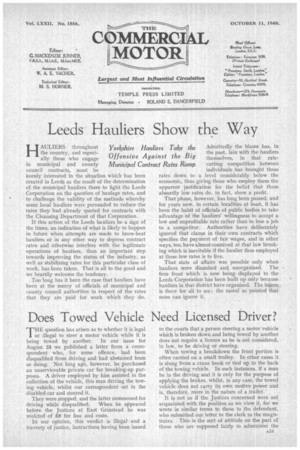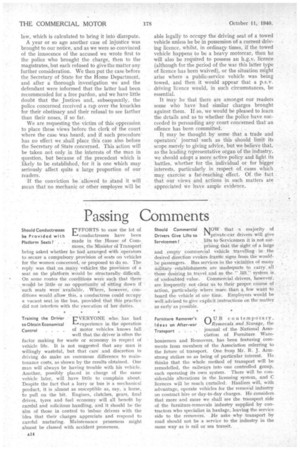Does Towed Vehicle Need Licensed Driver?
Page 15

Page 16

If you've noticed an error in this article please click here to report it so we can fix it.
THE question has arisen as to whether it is legal or illegal to steer a motor vehicle while it is being towed by another. In our issue for August 24 we published a letter from a correspondent who, for some offence, had been disqualified from driving and had abstained from so doing. Not long ago, however, he purchased an unserviceable private car for breaking-up purposes. A driver employed by him assisted in the collection of the vehicle, this man driving the towing vehicle, whilst our correspondent sat in the disabled car and steered it.
They were stopped, and the latter summoned for driving while disqualified. When he appeared before the Justices at East Grinstead he was mulcted of 26 for fine and costs.
In our opinion, this verdict is illegal and a travesty of justice, instructions having been issued to the courts that a person steering a motor vehicle which is broken down and being towed by another does not require a licence as he is not considered, in law, to be driving or steering.
When towing a breakdown the front portion is often carried on a small trolley. In other cases it is slung from a crane hook or tied up to the back of the towing vehicle. In such instances, if a man be in the driving seat it is only for the purpose of applying the brakes, whilst, in any case, the towed vehicle does not carry its own motive power and is, therefore, more in the nature of a trailer.
It is not as if the Justices concerned were not acquainted with the position as we view it, for we wrote in similar terms to these to the defendant, who submitted our letter to the clerk to the magistrates. This is the sort of attitude on the part of those who are supposed fairly to administer the law, which is calculated to bring it into disrepute.
A year or so ago another case of injustice was brought to our notice, and as we were so convinced of the innocence of the accused we wrote first to the police who brought the charge, then to the magistrates, but each refused to give the matter any further consideration. We then put the case before the Secretary of State for the Home Department, and after a thorough investigation we and the defendant were informed that the latter had been recommended for a free pardon, and we have little doubt that the Justices and, subsequently, the police concerned received a rap over the knuckles for their obstinacy and their ref usal to see farther than their noses, if so. far.
We are requesting the victim of this oppression to place these views before the clerk of the court where the case Was heard, and if such procedure has no effect we .shall place this case also before the Secretary of State concerned. This action will be taken not only in the interests of the man in question, but because of the precedent which is likely to be established, for it is one which may seriously affect quite a large proportion of our readers.
If the conviction be allowed to stand it will mean that no mechanic or other 'employee will be able legally to occupy the driving seat of a towed vehicle unless he be in possession of a current driving licence, whilst, in ordinav times, if the towed vehicle happens to be a heavy motorcar, then he will also be required to possess an h.g.v. licence (although for the _period of the war this latter type of licence has been waived), or the situation might arise where a public-service vehicle was being towed, and then it would appear that a p.s.v. driving licence would, in such circumstances, be essential.
It may be that there are amongst our readers some who have had similar charges brought against them. If so, we would be pleased to learn the details and as to whether the police have succeeded in persuading any court concerned that an offence has been committed.
It may be thought by some that a trade and operators' journal such as this should limit its scope merely to giving advice, but vie believe that, as the leading representative organ Of the industry, we should adopt a more active policy and fight its battles, whether for the individual or for bigger interests, particularly in respect. of, cases which may exercise a far-reaching effect. Of the fact that our views and actions in such matters are appreciated we have ample evidence.




















































